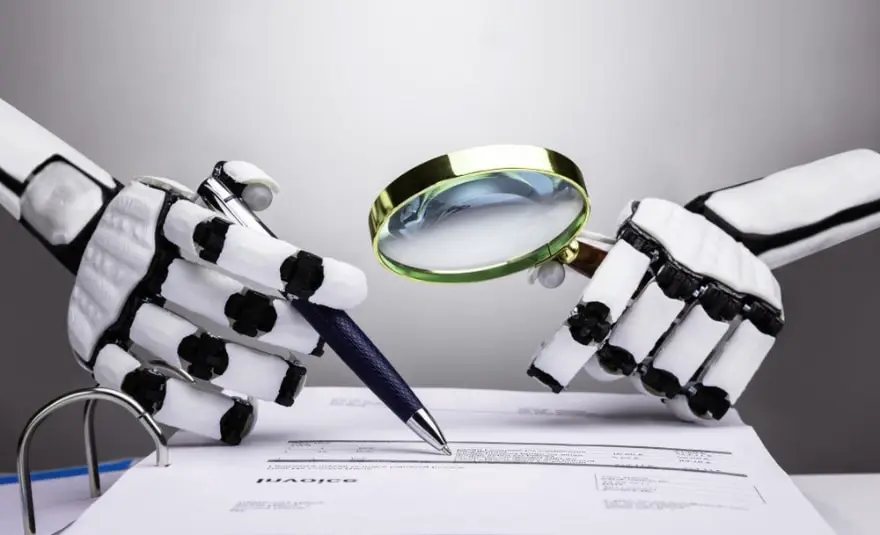You're in a doctor's office, a sterile, quiet room filled with polished tools and hushed conversations. The doctor orders a test, a standard procedure that has been done the same way for decades. Now, imagine a new kind of partner in that room: a silent, digital force capable of processing millions of data points in a heartbeat, spotting patterns no human could ever see. This isn't a scene from a science fiction film; it's the quiet revolution happening in medicine right now.
AIin healthcareis no longer a futuristic concept. It's a reality that is reshaping everything from how we diagnose illness to how we discover new cures. This isn't about replacing doctors with robots. Instead, it’s about giving our brightest minds a new kind of tool—one that makes them sharper, faster, and more precise. We're going to pull back the curtain on this transformation, looking at how artificial intelligence is not just a trend, but a fundamental change in how we think about health and wellness. This guide is your insider's look at a new era of medicine, where human intuition and machine intelligence work together to create better outcomes for all.
The Doctor's New Partner: How AI is Reshaping Diagnostics
When a doctor looks at a medical image—an X-ray, a CT scan, or an MRI—they are looking for a needle in a haystack. They are trained to spot tiny anomalies, but they are still human. Fatigue, distraction, and the sheer volume of images can make this process prone to error. AI changes the game entirely.
Medical Imaging: A Second Set of Eyes
AI-powered systems can analyze medical images with a speed and accuracy that is simply unmatched. A computer can scan thousands of images in the time it takes a human to review one, drawing on a vast library of past cases to spot even the most subtle signs of disease. For instance, in radiology, AI algorithms can assist in the early detection of diseases like cancer. A study published in The Lancetshowed that an AI system was just as accurate as a team of radiologists at detecting breast cancer in mammograms, and could sometimes outperform a single doctor. This technology acts as a safety net, making sure nothing is missed. It's not taking over; it's providing a second opinion, a digital one that is always fresh and always learning.
Predictive Analytics: The Crystal Ball of Health
Beyond images, AI can analyze a patient's entire medical history—from lab results to genetic data—to predict the likelihood of future health issues. This is known as predictive analytics. By looking at a patient's data, an AI system can identify individuals who may be at high risk for conditions like heart disease or diabetes. This allows doctors to intervene with preventive measures before a serious problem even appears. A team at Stanford University created an AI model that can predict the risk of heart failureusing electronic health records, giving doctors a tool to stay ahead of the curve. This moves medicine from a reactive practice to a proactive one, helping keep people healthy before they get sick.
Key Takeaway:AI is making medical diagnostics more precise and more proactive. It acts as an invaluable assistant, helping doctors spot diseases earlier and predict health risks before they become a problem.
From Lab to Life: Accelerating Drug Discovery with AI
The process of bringing a new drug to market is incredibly long, expensive, and filled with uncertainty. It can take over a decade and cost billions of dollars, with most new drugs failing to make it past clinical trials. AI is changing this, too, by bringing a new level of speed and efficiency to the laboratory.
Finding the Right Molecules
At the very beginning of the process, AI can search through a library of millions of molecular compounds to find the most promising candidates for a specific disease. This is a task that would take human scientists countless hours. An AI system can run thousands of simulations in minutes, identifying molecules that are most likely to work and have the fewest side effects. This can cut years off the drug discovery timeline. A report from the World Health Organization (WHO)highlights how AI can speed up research for new medicines, especially for diseases with few treatment options.
Optimizing Clinical Trials
Even after a drug is created, running a successful clinical trial is a complex process. AI can help with that, too, by identifying the right patients for a trial, analyzing trial data in real time, and making the entire process more efficient. This can help researchers get a clearer picture of a drug's effectiveness much faster, bringing life-changing treatments to those who need them sooner.
Key Takeaway:By analyzing vast amounts of data, AI is speeding up the creation of new medicines and making the development process more efficient, saving both time and money.
The Personal Touch: AI in Patient Care and Wellness
When we think of AI, we often picture big, complex machines. But some of the most exciting applications are happening at the most personal level—in our daily lives and in our interactions with the healthcare system.
Personalized Treatment Plans
Every person is different, and what works for one person may not work for another. AI can analyze a patient's unique genetic code, lifestyle, and medical history to suggest a treatment plan that is tailor-made for them. This means the right medication at the right dose, without the guesswork.
Remote Monitoring and Virtual Care
With the rise of smartwatches, fitness trackers, and other wearable tech, AI can analyze a constant stream of health data, from heart rate to sleep patterns. This allows for remote monitoring of patients with chronic conditions, so doctors can be alerted to a problem before it becomes an emergency. Remote care platforms also use AI to schedule appointments, answer common questions, and provide a seamless experience for patients from the comfort of their homes.
Key Takeaway:AI is making healthcare more personal by creating customized treatment plans and enabling doctors to monitor patients remotely, making care more convenient and more connected.
The Backbone of Modern Medicine: AI in Hospital Operations
A hospital is a living, breathing operation, a complex system of people, equipment, and resources that need to be managed perfectly. AI is helping hospitals run more smoothly, allowing doctors and nurses to focus on what matters most: the patients.
Scheduling and Resource Management
Hospitals often deal with a complex schedule of surgeries, appointments, and staff shifts. AI-powered systems can optimize these schedules to reduce wait times for patients and improve staff efficiency. They can also predict demand for hospital beds and other resources, helping administrators prepare for busy periods, like flu season. This can make a big difference in a hospital's ability to provide quality care, especially during times of high stress.
Reducing Administrative Work
Doctors and nurses spend a significant amount of time on administrative tasks—filling out forms, updating patient records, and writing notes. AI can automate many of these tasks, freeing up valuable time. An AI system can listen to a doctor's conversation with a patient and automatically populate their medical records, reducing the time spent on paperwork and allowing for more meaningful patient interaction.
Key Takeaway:By streamlining administrative and logistical tasks, AI is helping hospitals run more efficiently, which in turn leads to better care for patients.
The Human Element: Addressing the Concerns and Ethics of AI in Healthcare
The integration of AI in medicine is not without its questions. As a society, we have to consider the ethical side of this new technology. This is a conversation that is happening right now, with doctors, researchers, and policymakers all working to find the right answers.
Bias in AI
AI systems are only as good as the data they are trained on. If the data used to train a system is not diverse, the AI could develop a bias against certain populations, potentially leading to inaccurate diagnoses or treatment plans. The medical community is actively working to ensure that data sets are inclusive, so that AI tools work for everyone, regardless of their background. A recent article from Nature Medicinehighlights the ongoing work to address this very issue, showing that the research is already underway.
Data Security and Privacy
The use of AI in healthcare requires access to vast amounts of sensitive patient data. This raises serious questions about data security and privacy. Strong regulations and strict security measures are needed to ensure that this data is protected and used only for its intended purpose.
The Role of the Doctor
Ultimately, AI is a tool, not a replacement. A doctor's human judgment, empathy, and ability to connect with a patient are things that an AI cannot replicate. The future of medicine is not about machines taking over, but about a powerful partnership between humans and technology, with the human touch remaining at the heart of care.
Conclusion: The Future is a Partnership
The arrival of AI in healthcaremarks a significant turning point in the history of medicine. It offers the promise of a world with earlier diagnoses, faster drug discoveries, and more personalized care. This is a future where the doctor is a master of their craft, armed with a new kind of intelligence that makes them even more effective. As we move forward, the most important work will be ensuring this technology is used ethically and responsibly, always with the patient's well-being at the very center. The future of medicine is a partnership, and it's looking brighter than ever.
Frequently Asked Questions
1. Is AI already being used in hospitals and clinics?
Yes, AI is already being used in a number of areas, particularly in medical imaging, where it helps radiologists read scans more quickly and accurately. It is also being used in some hospitals to help with administrative tasks, like scheduling and resource management.
2. Will AI make healthcare more expensive?
The goal is for AI to make healthcare more efficient and, in the long run, more affordable. By reducing administrative costs, speeding up drug discovery, and helping with early detection of diseases, AI could help lower costs for both patients and the healthcare system.
3. Is my medical data safe with AI systems?
Reputable AI systems in healthcare are held to strict privacy and security standards. They use a number of security measures to protect your data, and regulations are in place to ensure your information is handled correctly.
4. Is AI replacing doctors?
No. AI is designed to support doctors by handling repetitive tasks, analyzing data faster, and improving accuracy—not replacing human care.
5. Is my health data safe with AI?
AI systems follow strict security protocols, but data privacy remains a concern. Regulations are improving to ensure data is stored and used ethically.
6. Can I trust AI in healthcare?
If the AI is FDA-approved or backed by scientific validation, yes. But like any tool, it depends on how it's built and used.
Leave a comment
Your email address will not be published. Required fields are marked *



